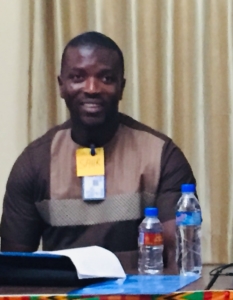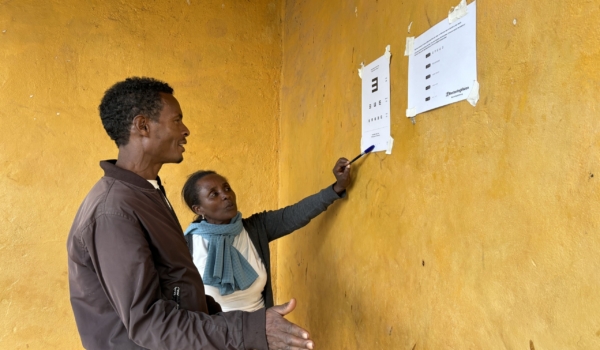
Sahr Joseph Nyuma, Last Mile Health’s County Manager in Rivercess County, Liberia.In collaboration with other partners and donors, Sahr and his colleagues are supporting Liberia’s Ministry of Health to train and equip the country’s nearly 4,000 community and frontline health workers to safely respond to COVID-19, while continuing to provide essential primary healthcare in remote communities.
Sahr Joseph Nyuma works for Last Mile Health as a County Manager in Rivercess County, Liberia. In collaboration with other partners and donors, Sahr and his colleagues are supporting Liberia’s Ministry of Health to train and equip the country’s nearly 4,000 community and frontline health workers to safely respond to COVID-19, while continuing to provide essential primary healthcare in remote communities. Here, Sahr updates us on the COVID-19 response in Rivercess County – one of the country’s most remote counties.
What is the situation like in Rivercess County?
[When COVID-19 first emerged] we started to experience a decrease in facility attendance. People are still carrying the fear from Ebola, so hearing about the coronavirus has actually put a lot of [mistrust] in the health system.
We realized that essential services at the hospital were not being utilized at normal levels. Patients were not coming to the health facility because they feared that they would be infected. We also had issues with availability of personal protective equipment. And worst of all, we had serious knowledge gaps in terms of what health workers needed to do to prevent and manage the spread of coronavirus.
Last Mile Health swiftly moved in to work closely with the County Health Team by providing health workers with requisite knowledge about coronavirus, including training on how to break the chain of transmission in a health facility and the community, and what type of care health workers need to provide to suspected cases.
Can you explain why people may not access routine health services during a pandemic like this?
There is a myth that health workers are responsible for the spread of [COVID-19]. People also have this belief that the introduction of a vaccine would be used to spread the virus further. So because of that, people became very afraid and stopped going to the health facilities.
Even our health workers were afraid when we had our first suspected case in the county, because they hadn’t been trained on COVID-19 yet. They weren’t confident that, at that point in time, they could provide care to this patient who was suspected of having COVID-19. Now, they are very confident. There are screening measures that have been put in place to assess patients… and all health workers are now confident that they have the skills to screen for this condition and the actions they need to take [if there is a suspected case].
What is your team doing to prepare for and respond to COVID-19?
The Rivercess County Health team [with support from Last Mile Health] has trained all health facility staff—including clinicians and non-clinical staff like pharmaceutical dispensary staff and hospital cleaners—in infection prevention and control and provided personal protective equipment to make our health facilities a safe place where patients can go to access health services [despite the outbreak].
We are also training all community health workers to educate their communities on the signs and symptoms of COVID-19, dispel myths linking COVID-19 to Ebola, encourage community-based risk mitigation measures like social distancing, hand washing, and mask use, and refer any suspected cases for treatment.
With all of the measures we’ve put in place, we are very hopeful that, between the adherence of health workers to infection prevention and control practices and the trust we have gained from the community, Rivercess will remain virus-free.
Can you explain the purpose of infection prevention and control training?
The purpose of infection prevention and control training is to train health workers on the practices they need to put in place to create a safe environment for patients and for themselves. Community health workers live in the communities they serve, so if they are not safe and they get infected, they could introduce this virus into the community.
Community and frontline health workers are leading efforts to stop COVID-19 transmission in their communities by educating community members, screening for the disease during routine visits, and referring patients to care. We are confident these health workers know the measures they need to take in order to provide better care for their patients, for themselves, and also for their communities.
Why is it important to include community health workers in the COVID-19 response?
Health and other social problems are rooted in the community and community health workers are part of the community: they understand the terrain, they understand cultural practices and they were selected by their neighbors to serve. So, when a person who is part of the community is telling a community member to follow certain health measures, there is a level of trust that can’t be replicated.
Community health workers serve as ambassadors to inform the community about preventive measures and remind them that we are not in normal times. As much as we may want to have occasions, celebrations, and funerals, we need to consider our own safety, consider our own lives, and follow the health recommendations. [Last Mile Health] could go into the community and say these things, but it wouldn’t have the same impact because we are not one of them. But having a [community health worker] who the community trusts relay this message, they have the power to influence the community’s decision and impress important information upon them. It cannot be overstated how important community health workers are to the COVID-19 response.
How has the public’s perception of COVID-19 changed?
Back in March, it was difficult to get people to adhere to precautionary measures like handwashing and social distancing. Nowadays, everyone is following these recommendations. People are willing to wash their hands, to use masks in public, to social distance. The adherence from the public has been great.
Anything else to share?
There is a very thin line between the period of emergency response and development. Let’s use this opportunity to look into the future. If we happen to have a new emergency tomorrow, what systems need to be in place to respond effectively? Now is the time to prioritize community health as part of the primary healthcare system. COVID-19 is going to have a lasting effect on the health system, so let’s make sure the investments we make for today’s response create the foundation for a stronger future.




